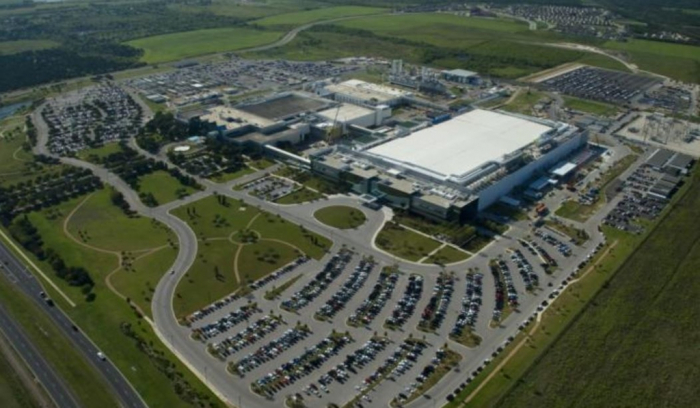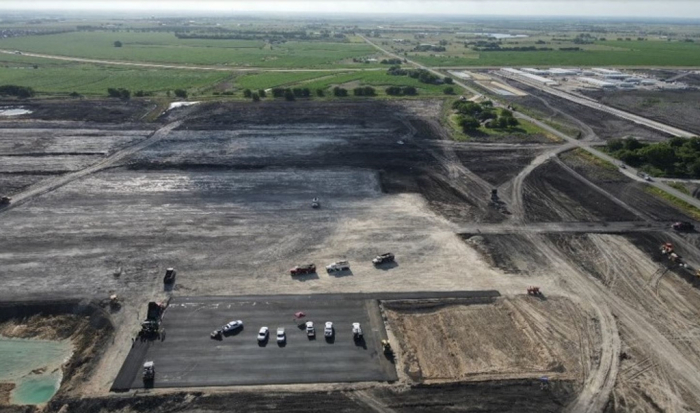Korean chipmakers
Samsung presents Texas with $200 bn chip investment plan proposition
Samsung files application for tax incentives including proposal to build 11 plants; Samsung does not have specific plan for now
By Jul 22, 2022 (Gmt+09:00)
3
Min read
Most Read
Samsung steps up AR race with advanced microdisplay for smart glasses


When in S. Korea, it’s a ritual: Foreigners make stops at CU, GS25, 7-Eleven


Seoul-backed K-beauty brands set to make global mark


Maybe Happy Ending: A robot love story that rewrote Broadway playbook


K-pop stocks surge as China set to loosen cultural ban after 9 years



Samsung Electronics Co., the world’s top memory chipmaker, has presented a tax break proposal to the State of Texas as part of its plan to invest some $200 billion in 11 new semiconductor plants in the state over the next 20 years.
The Texas Comptroller's office has received Samsung’s recent application for tax incentives including its investment proposal, according to industry sources on Friday. Other chipmakers such as the Netherlands' NXP Semiconductors N.V. and Texas Instruments Inc. also made such filings.
Samsung and those companies were known to have submitted the applications mainly due to the expiration of the state’s incentive program offering property tax breaks over 10 years for major investments, industry sources said.
But semiconductor sector experts in South Korea were concerned that Samsung may shift its investment focus to the US if its home country cannot offer the same level of incentives.
TO BUILD ELEVEN NEW PLANTS
Samsung has proposed to build 11 new semiconductor plants in Texas by investing $167.6 billion in nine factories in Taylor and spending $24.5 billion on two facilities in Austin, creating about 10,000 jobs, according to the Wall Street Journal and local media in Austin.
The chipmaker aims to complete the construction of some of them by around 2034 and start operations of the others in the next decade.
US Commerce Secretary Gina Raimondo welcomed the proposal.
“Samsung’s investment would be transformational for America’s domestic chip manufacturing industry, create thousands of good paying jobs and secure our ability to lead the world in 21st Century innovation,” Raimondi said in a statement on Thursday.
Samsung, however, does not have specific investment plans for now and made the proposal ahead of the December expiry of the state’s Chapter 313 property tax incentives program, according to industry sources in Seoul.
The tech giant is already operating two chip plants in Austin while building a new one in Taylor with a $17-billion investment.

SOUTH KOREA, CHINA
The proposal to the State of Texas could upset not only South Korea but also China.
China has already spoken out repeatedly on such issues as the US is forming a "Chip 4" semiconductor alliance with South Korea, Japan and Taiwan.
China's Ministry of Foreign Affairs Zhao Lijian said on July 19 that the US has repeatedly abused its state power, politicized sci-tech and trade issues, engaged in "coercive diplomacy," and attempted to promote an industrial decoupling, which has undermined international trade rules and divided the global market.
South Korea’s government is likely to keep an eye on the global semiconductor industry’s investment as the US is seeking a $54-billion law to support the sector, which could drive local chipmakers, especially Samsung and SK Hynix Inc. to spend there.
The government decided to raise tax incentives on investments in chip facilities and ease rules on semiconductor plant construction, but those measures still need approval from lawmakers.
“The US maintains the tax deduction rate for semiconductor capex at higher than 20%,” said a South Korean chip industry source, referring to capital expenditures. “Unless the country continues to increase incentives on chip investments, the sector’s domestic spending may be smaller than expected.”
Write to Shin-Young Park at nuysos@hankyung.com
Jongwoo Cheon edited this article.
More to Read
-
 Korean chipmakersSamsung Elec's Q2 earnings signal end of upward run
Korean chipmakersSamsung Elec's Q2 earnings signal end of upward runJul 07, 2022 (Gmt+09:00)
3 Min read -
 Business & PoliticsSamsung leader Lee, Intel CEO Gelsinger discuss chip alliance
Business & PoliticsSamsung leader Lee, Intel CEO Gelsinger discuss chip allianceMay 30, 2022 (Gmt+09:00)
4 Min read -
 Corporate investmentSamsung to invest $355 billion in chip, biotech, 6G over five years
Corporate investmentSamsung to invest $355 billion in chip, biotech, 6G over five yearsMay 24, 2022 (Gmt+09:00)
3 Min read -
 Korean chipmakersSamsung’s $17 billion new chip plant in Taylor aims to rein in TSMC
Korean chipmakersSamsung’s $17 billion new chip plant in Taylor aims to rein in TSMCNov 24, 2021 (Gmt+09:00)
4 Min read
Comment 0
LOG IN


